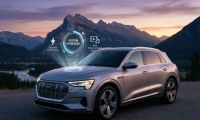
Porsche expects to be able to produce electric vehicles with a range exceeding 800 miles (1,300 km) in the medium term. This will be achieved by optimizing the anode of an EV, which is one of the key components of a battery.
Porsche currently uses graphite as an active anode material but is developing silicon anodes. Silicon anodes offer up to 10 times more storage capacity than graphite, which could lead to a significant increase in range. However, there is one issue with silicon anodes: they expand by 300% when they absorb lithium, meaning that the service life of the battery would be impaired. Porsche is currently working on anodes made up of up to 80% silicon, which should help to mitigate this issue.
In addition to optimizing the anode, Porsche is also working on increasing the proportion of nickel in the cathode. Nickel offers higher charging capacities, which could also help to improve range.
“In the medium term, we can expect the combination of new anode chemistry and dense packaging of the cells to allow a vehicle range of 1,300 km (807 miles),” said Professor Maximilian Fichtner, director of the Helmholtz Institute Ulm and Head of the Energy Storage Systems research unit at the Karlsruhe Institute of Technology (Ref. Carscoop).
Porsche is not the only car manufacturer working on ways to improve the range of electric vehicles. Other companies, such as Tesla and General Motors, are also investing in new battery technologies.
As battery technology continues to improve, we can expect to see electric vehicles with longer and longer ranges. This will make electric vehicles a more viable option for people who need to travel long distances.
In addition to improving range, Porsche is also working on reducing the charging time for electric vehicles. Currently, it can take several hours to charge an electric vehicle. However, Porsche is working on developing new charging technologies that could reduce charging times to as little as 15 minutes.
Faster charging times will necessitate the development of more powerful charging stations. Charging sockets will also need active cooling so that charging capacities exceeding 500 kW can be conducted reliably.
Speaking of EV charging and charging sockets, see this video from Torque News Youtube channel on how Toyota hits breakthrough with wireless EV charging.
The development of new battery technologies and faster charging times is essential for the widespread adoption of electric vehicles. As these technologies continue to improve, we can expect to see a significant increase in the number of electric vehicles on the road in the coming years.
Armen Hareyan is the founder and the Editor in Chief of Torque News. He founded TorqueNews.com in 2010, which since then has been publishing expert news and analysis about the automotive industry. He can be reached at Torque News Twitter, Facebok, Linkedin and Youtube.
Set Torque News as Preferred Source on Google





